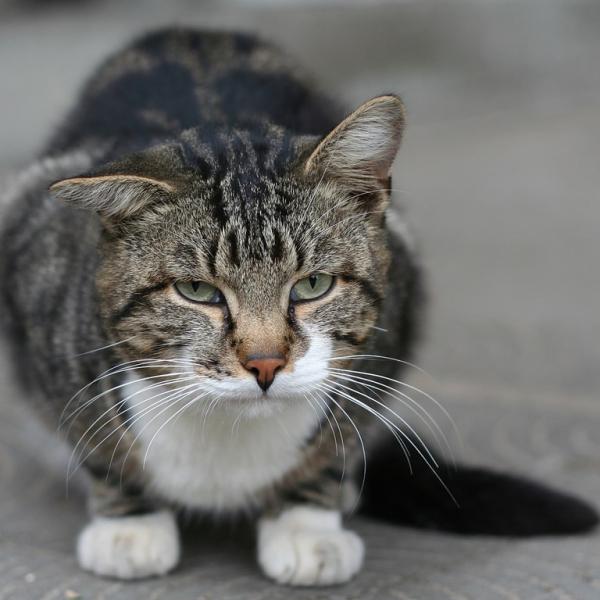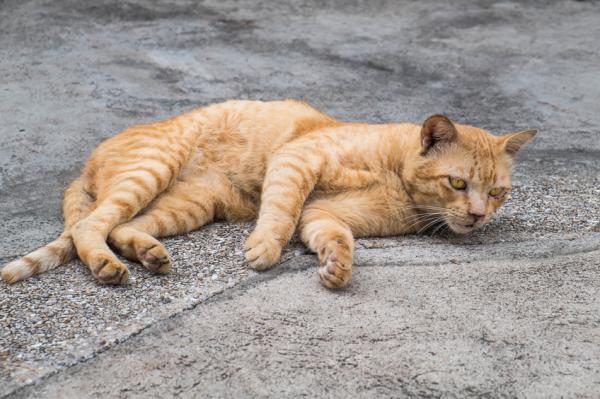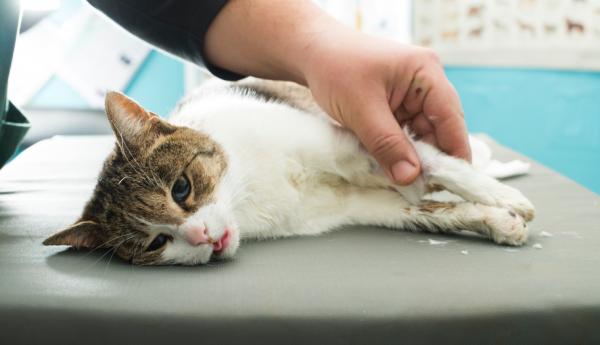Arthritis in cats – Symptoms and treatment

As happens to humans, cats can suffer many diseases related to the joints, such as feline rheumatoid arthritis, a condition that produces inflammation and muscle pain, among other symptoms. This disease is not easy to detect since the pussycat usually disguises very well when they have pain, and it is difficult to realize at first sight that our pet suffers it if we do not know exactly what signs we should look at.
That is why it is important to know the symptoms of arthritis in cats, like its treatment and the special care we have to offer the cat, so if you are interested in this topic, keep reading this article and find out everything you need to know about the feline arthritis.
What is arthritis?
La feline arthritis, also called feline osteoarthritis, is a chronic inflammatory disease that can affect any age of the cat and is characterized by inflammation of the joints and wear of the protective layers that line the joints of the animal, which causes pain, stiffness and loss of mobility, among other symptoms. This disease is degenerative, that is, it gets worse over the years, and do not confuse it with another that is also: osteoarthritis. Osteoarthritis in cats usually affects when they are elderly and, unlike arthritis, this disease causes the progressive loss of cartilage which, in turn, causes the bones to rub and wear away. Although osteoarthritis and arthritis are very similar in cats (and in other living beings), they are not the same.
The causes that can produce rheumatoid arthritis in cats They are very diverse and may have different origins:
- Post-traumatic: due to injuries, blows or traumas that the cat has suffered.
- Infectious: due to germs or bacteria that may have affected the joints.
- Genetic: due to malformations of the limbs and other development problems.
- Immunological: due to the cat’s own immune system that reacts against the synovial membrane (the protective layer that covers) of the joints.
- Obesity and overweight: it is not a direct cause but it can aggravate the symptoms and favor the inflammation of the joints if it is not controlled.

Symptoms of arthritis in cats
The symptoms your cat can show if he has feline rheumatoid arthritis are:
- Inflammation of the joints
- Loss of mobility and less exercise than usual
- Pain and muscular atrophy
- Crunches in the joints
- Difficulty and rigidity to move, jump, climb stairs, get up, etc.
- Change of habitual mood: it will be more passive, distant, despondent, etc.
Detecting arthritis in cats is not an easy task since these animals are very skilled in concealing the weaknesses and normally, They do not usually complain or show pain when they have it so if your cat shows the least of these signs, it is important that you take it immediately to the veterinarian to make a complete diagnosis that will include, depending on its evolution, a blood test, a history of the injury or trauma suffered, and x-rays to see the status of the bones of the pussycat.
Treatment of arthritis in cats
The treatment of feline arthritis begins with the prescription, always by the veterinarian, of non-steroidal anti-inflammatory drugs (NSAID) to relieve pain and minimize inflammation of the joints, as well as taking pharmacological supplements such as chondroitin or glucosamine to help relieve the symptoms of the animal. Surgery is always the last option and will only be done if the arthritis is very developed and the veterinarian considers it really necessary.
But in addition to conventional medical treatments with analgesics for cats, you can also help improve feline arthritis with some homeopathic medicines for cats and cats. Natural medicine such as lecithin, natrium sulphate or calcium floride, or even, with acupuncture and therapeutic massage.
To prevent the appearance of arthritis in cats it is advisable that the animal has an adequate diet and exercise regularly and moderately, so your musculoskeletal system will remain in good condition and will be less likely to suffer from this disease. If the cat is overweight or obese, it is recommended to lose weight to reduce the burden on your joints and reduce inflammation. You can visit this article if you want to know some exercises for obese cats or consult a balanced diet to your veterinarian.

Care of the arthritic cat
Apart from regular exercise and proper nutrition, if your cat has arthritis you should provide a series of special cares to make your life easier and your illness more bearable.
First of all, it is necessary that your kitten is as comfortable as possible at home, so if you put some blankets or several soft towels on your bed and everywhere you know you like to stretch, your cat will rest much better and your joints will hurt much less than if your body touches directly with flat and bare surfaces, cushioning possible blows. In addition, you can include some compresses or hot water bags in your padded bed to relieve inflammation of the affected areas. The cold and humidity aggravate the pain of arthritis in cats so it is necessary to make your home a warm, dry place without sudden changes in temperature. You can also avoid slippery floors so your cat does not fall by accident.
It is also necessary that your pussy cat has the fewer possible obstacles when it comes to living at home, so if you could previously climb to a place that was your favorite and now can not, it would be good to provide a ramp instead of stairs or other surfaces that will cause more pain in your joints if You have to upload them, like shelves or boxes. Also, your litter box and your feeder / drinker should also be located in an area where the cat can easily reach, so if you have a house with several plants, ideally have a litter box and a feeder / drinker on each floor so you do not have to continually go up and down.
And finally, you must avoid at all costs that your cat is stressed and you must treat it with a lot of love, love and patience, so you know that you can count on you and that nothing happens because you have arthritis. A calm, comfortable and without obstacles are the keys to keep your arthritic cat happy.
This article is merely informative, in .com we do not have the faculty to prescribe veterinary treatments or make any kind of diagnosis. We invite you to take your pet to the veterinarian in case of any type of condition or discomfort.
If you want to read more articles similar to Arthritis in cats – Symptoms and treatment, we recommend that you enter in our section of degenerative diseases.


